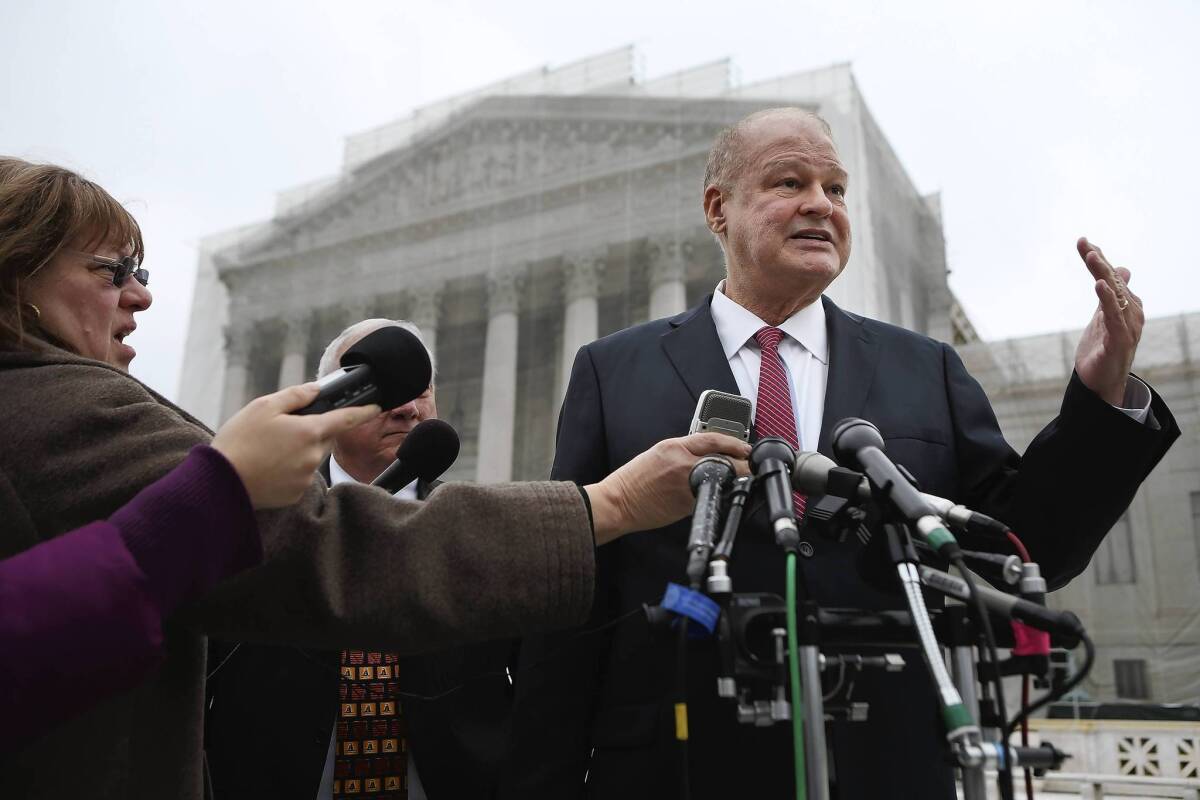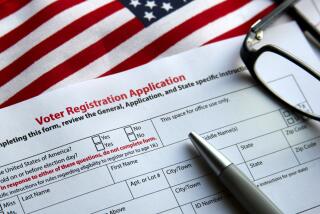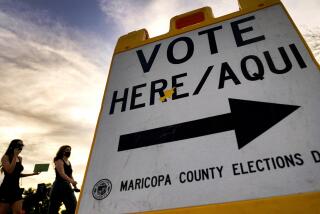Supreme Court hears challenge to Arizona’s voting requirements

WASHINGTON — Jesus Gonzalez, a Catholic school janitor from Yuma, Ariz., tried to register to vote on the day he became a U.S. citizen. He tried again when he got a driver’s license, but he was rejected both times.
He became the lead plaintiff in a lawsuit that came before the U.S. Supreme Court on Monday, testing whether Arizona and other states can demand extra proof of citizenship before residents can register to vote.
The Mexican American Legal Defense and Educational Fund sued Arizona, contending Gonzalez and 31,000 other eligible voters were wrongly rejected when they tried to register. Their lawyers argued the state was violating the federal “motor voter” law, which tried to make registration simple and easy. Last year, a coalition of civil rights groups won before the U.S. 9th Circuit Court of Appeals, which ruled that Arizona’s proof-of-citizenship requirements conflicted with the federal law.
During oral arguments involving the latest clash over election rules and voting rights, the justices sounded closely divided along ideological lines.
Arizona Atty. Gen. Thomas Horne urged the court to reinstate the state’s requirements, which he said put a “minimal burden” on new voters. Federal law should not bar states from “taking sensible precautions to prevent noncitizens from voting,” Horne said. If the state cannot ask for proof of citizenship, he said, “it’s essentially an honor system.”
He ran into skeptical questions from Justices Sonia Sotomayor, Ruth Bader Ginsburg and Elena Kagan, all of whom noted the federal law said the state must accept the mail-in form for registration.
Justice Anthony M. Kennedy, often a swing vote in ideological battles, noted that if states could ask for proof of basic information, such as a birth date, the simplified “federal form is not worth very much.”
Some of the court’s conservatives questioned why the state could not ask for more proof. Suppose a boy who looked to be 13 years old arrived on a bicycle and turned in the federal mail-in form, Justice Samuel A. Alito Jr. said. Could an official ask him for proof of his age?
No, said Patricia Millett, an attorney representing the groups challenging the law. It would not be appropriate to demand more information, she said, but officials may check their state “records or databases” before deciding whether to register the new voter.
Justice Antonin Scalia sparred with the Obama administration’s lawyer, Sri Srinivasan, over whether the federal law barred states from adding extra requirements. “It would not be a problem” if the federal form did not include all the needed information, Scalia said. “The state will do it. No problemo.”
The case turns on the National Voter Registration Act, better known as the Motor Voter Act, which Congress passed 20 years ago to streamline the voter registration process. The law led to the creation of a one-page form that permits new voters to register by mail. Applicants must give their full name, address and birth date and sign a statement that they are eligible to vote. The federal law says, “Each state shall accept and use” the federal form to register voters.
In 2004, however, Arizona’s voters adopted a measure that required new applicants to furnish some proof of citizenship. This could include a driver’s license, Social Security number, U.S. passport, birth certificate or naturalization document.
Kennedy, who is likely to hold the deciding vote, said Monday he was not persuaded by the 9th Circuit’s view of the case. Its opinion struck down the Arizona law based on the theory that the Constitution gives Congress the ultimate power to regulate elections. Kennedy disagreed.
“It seems to me … the state has a very strong and vital interest in the integrity of its elections,” he said. “The 9th Circuit’s new test did not give sufficient weight to that interest.”
The justices are not likely to hand down a decision until June in the case, Arizona vs. Inter-Tribal Council. If Arizona’s law is upheld, similar measures are likely to take effect in Alabama, Georgia, Kansas and Tennessee.
More to Read
Sign up for Essential California
The most important California stories and recommendations in your inbox every morning.
You may occasionally receive promotional content from the Los Angeles Times.











